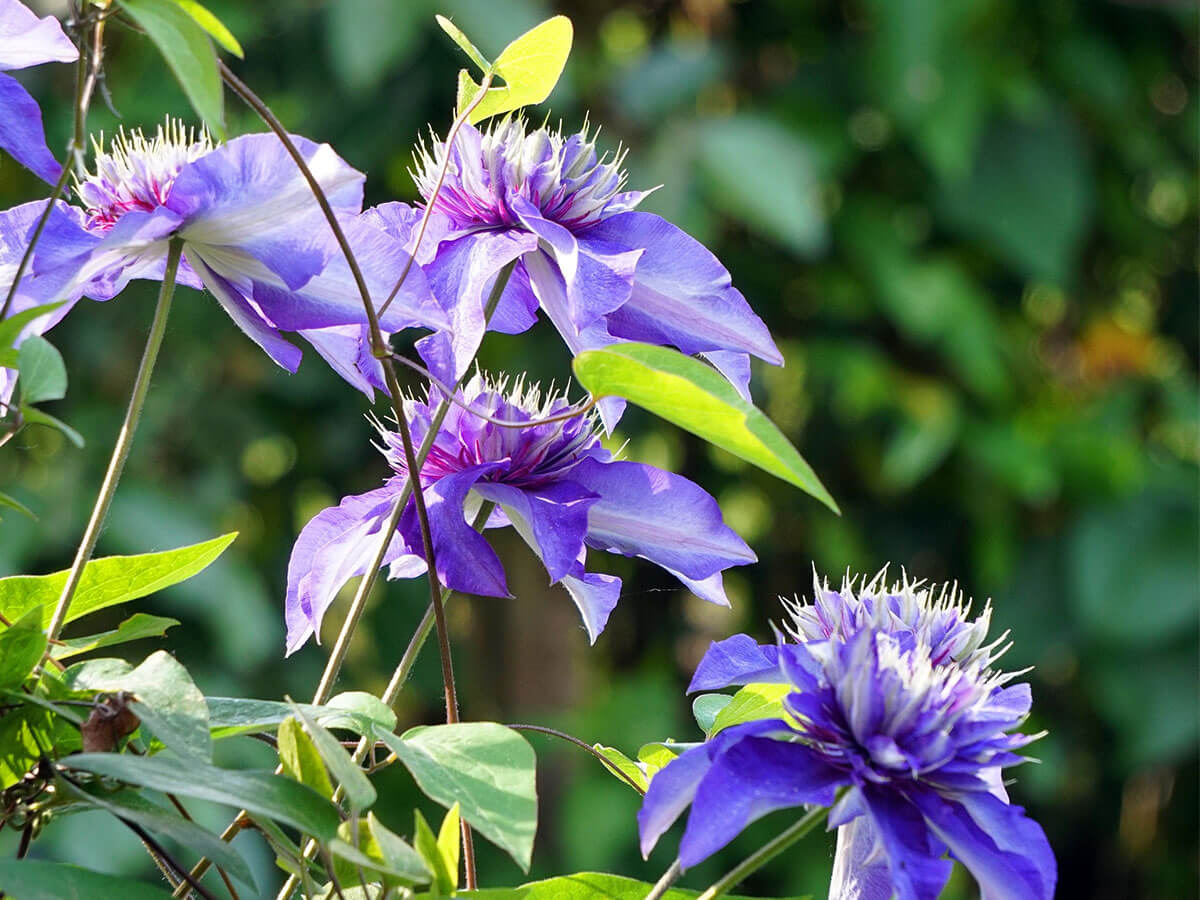8 Best Climbing Plants for a Balcony Garden
April, 2023 |A wall of green foliage and colorful flowers can create an eye-catching feature on a balcony. Adding depth and height, climbing plants help to create your own mini sanctuary.
Plus, when garden space is limited, choosing plants that grow ‘up’ instead of ‘out’ is ideal for saving space!
Other benefits of growing climbing plants include:
- Great for providing privacy and screening from neighbors
- Usually fast growing vining plants that will add impact quickly
- Creates a wall of lush flowers or foliage
From beautiful flowering vines with bold, colorful flowers, to dense, textured foliage that can provide privacy and screening. These climbing plants will happily cling and climb to a frame, trellis, or vertical support on your balcony.
Climbing plants for a balcony garden
I’ve included a mix of evergreens, annuals, and bold flowers on this list. However, if you’re specifically looking for climbers to provide color and interest year-round, check out these evergreen climbing plants too!
These climbing plants all grow well in containers making them ideal for a balcony garden. They should also all be easy to find in your local garden center or nursery.
1. Clematis
From ruffled petals to huge dinner plate-size flowers, there’s an amazing variety of clematis colors and flower shapes to choose from. The vines will need something to cling to for support, like a trellis or frame.
They’re perennial in most climates, so will come back year after year. You may need to do some light pruning, so double-check the pruning requirements of your variety.
Clematis thrive when their roots are in a moist shady location with foliage and flowers in full sunshine. Placing another container in front is a great way to shade the roots while letting the foliage soak up the sunshine.
USDA Hardiness: Zones 4 to 9
Best for:
- Beautiful, bold flowers in summer, feathery seed heads in autumn
- Hundreds of varieties to choose from
- Neat, compact growth

2. Trumpet Vine (Campsis radicans)
With its bright tropical flowers, the trumpet vine can add vibrant color to your balcony through the summer. The flowers contain lots of nectar, so it’s also one of the best plants to attract hummingbirds!
It’s a woody perennial, so flowers and foliage should come back year after year. Planting it in a container that receives plenty of sunshine will encourage it to produce more flowers.
Trumpet vines can be invasive when planted directly in garden soil, however, keeping them in containers helps to keep them contained!
USDA Hardiness: Zones 5 to 9
Best for:
- Fragrant flowers
- Attracting hummingbirds to your balcony

3. Ivy (Hedera)
Ivy is one of the best evergreen plants for a balcony because it’s a plant that can provide year-round coverage. If you’re looking for slim or narrow plants to provide screening then ivy is ideal.
It can be a pretty vigorous climber, so you may want to trim it in the spring to manage its height or size. Because of its strong, aerial roots along the stems, it can climb up pretty much anything without much support.
USDA Hardiness: Zones 4 to 11 (depending on variety)
Best for:
- Evergreen coverage throughout the year
- Providing privacy and screening
- Shady balconies
- Good low maintenance plant for a balcony

4. Morning Glory
With heart-shaped leaves and showy, trumpet-shaped flowers, these fast-growing vines are always a beautiful addition. They’re perennial in hotter climates, but usually grown as annuals in areas that experience frosts.
Their bold flowers should last from summer through to the first frost, giving you a long-lasting display. You can find them in a lovely variety of colors, from ‘Candy Pink’ to ‘Heavenly Blue’ which has vibrant blue flowers.
USDA Hardiness: Zones 2-11
Best for:
- Bold flowers with lots of different colors to choose from
- Fast-growing vine

5. Melons and Cantaloupes
A climbing plant with tasty fruits? Yes please! Growing melons vertically is a great way to save space, while still enjoying tasty homegrown fruits. Melon plants produce a strong vine that will happily climb up a sturdy trellis or support frame.
Melons for cooler climates, like the Blacktail Mountain watermelon, can tolerate variable summers in cooler areas.
While melons are ideal for south-facing balconies, or gardens with plenty of sunshine, they aren’t suited to shadier balconies. Ivy and other shade tolerant climbers would work well instead.
USDA Hardiness: Zones 3 to 11 (depending on variety)
Best for:
- Tasty Fruits!
- Hanging fruits and foliage look really attractive
- South facing balconies
6. Grapes
Growing grapes on a balcony is a great way to bring a little Mediterranean style to your space. Plus tasty fruits!
There are some brilliant cold hardy grape varieties to choose from that will survive (and thrive!) in a more northern climate. Even down to USDA hardiness zone 3!
Of course, any vertically growing fruit or vegetable plants would work well in a balcony garden. From mini pumpkins to cucumbers or beans.
USDA Hardiness: Zones 3 to 11
Best for:
- Delicious fruits
- Attractive foliage that adds a Mediterranean style

7. Sweet Peas
A cottage garden classic, sweet peas have that signature, romantic style with their delicate foliage and colorful, pink, purple, or white flowers.
They’re a pretty vigorous vining plant that will easily climb up a trellis or a simple bamboo support structure. They’ll bloom all through the summer in most climates. But in hotter areas, start seeds in the fall for early spring blooms, as they don’t tolerate heat.
USDA Hardiness: Zones 4 to 9
Best for:
- Sweet, floral fragrance
- Beautiful, jewel-colored flowers
- Cut flowers

8. Nasturtiums
For waterfalls of flowers, you really can’t beat the beauty and performance of nasturtiums.
In warmer climates you can grow them as perennials, however, most of us will grow them as annuals.
Nasturtiums are so easy to grow, with big seeds that are easy to handle. This makes them great flowers to grow with children.
USDA Hardiness: Zones 4 to 9
Best for:
- Endless cascades of beautiful flowers
- Edible leaves!

Featured Image: Clematis by Matthias Böckel from Pixabay





